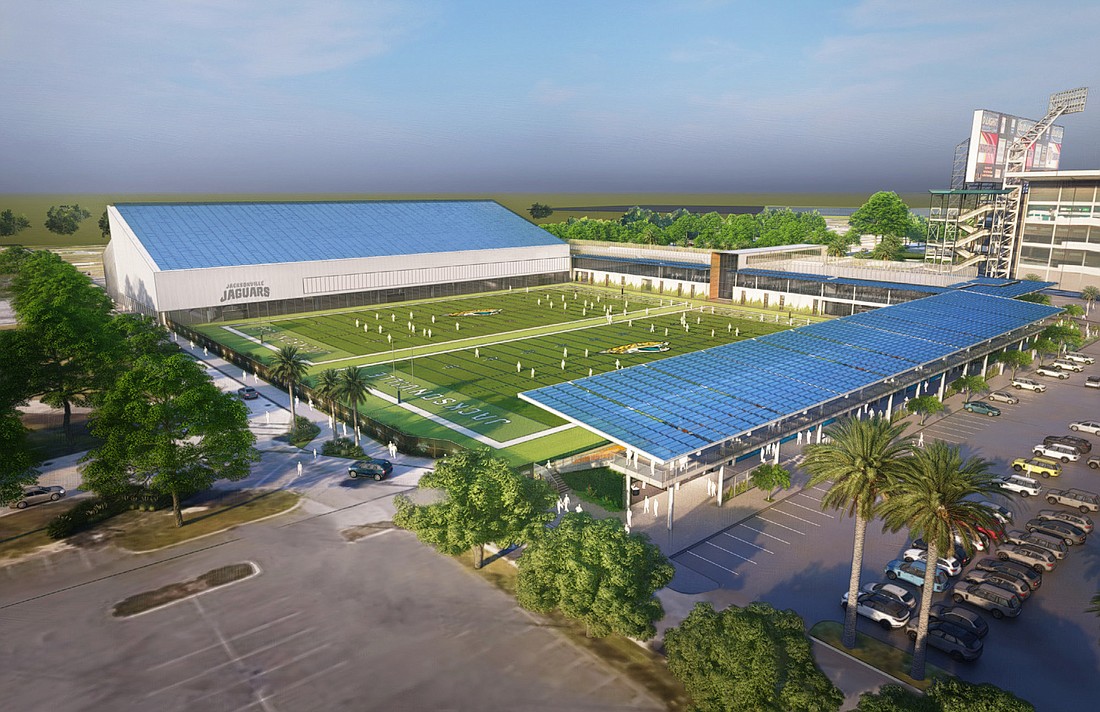
Two City Council committees signed off Aug. 17 on a deal with the Jacksonville Jaguars to split the cost of the team’s proposed $120 million football performance center.
The Council Finance and Rules committees voted 7-0 to advance the public-private partnership in Ordinance 2021-0495 to the full Council for a final vote next week.
If approved, the bill would authorize the city to borrow $60 million to help finance the NFL team’s proposed 127,087-square-foot practice and training facility northwest of TIAA Bank Field and to amend the Jaguars’ stadium lease with the city.
The Jaguars would pay for the other $60 million, according to the city’s proposed economic development agreement for the project.
After the Finance Committee vote, Jaguars President Mark Lamping said the team’s 19 community town halls and meetings with each Council member resulted in unanimous support from the committees.
“There’s been a lot of work done in advance — a lot of one-on-one communication with individual Council members, a lot of outreach into the community. And I think that we’ve seen that’s time very well spent,” Lamping said.
“I think we see the dividends of that today. There are no surprises. Everyone gets plenty of time to contemplate the proposal that was put in front of them,” Lamping said.
Jaguars owner Shad Khan, Lamping and head coach Urban Meyer pitched a city-owned practice facility concept June 3 during a media event about Khan’s plans for a Four Seasons hotel-anchored development on the Downtown riverfront.
The bill says the facility will have team offices; an equipment room; weight training and medical facilities; an indoor practice field; two outdoor natural-grass fields with about 2,300 bleacher seats; a team store; and concession facilities.
A Council Auditors Office analysis of the deal shows the city will pay $3.5 million annually for 30 years on the $60 million in debt proposed to pay for the public portion of the project.
That’s $105 million total.
Finance Committee Chair Ron Salem said the city’s maintenance and facilities expenses will be reduced by about $1.317 million annually when the Jaguars move into the performance center.
The deal would make the Jaguars responsible for all maintenance and repairs costs at the facility.
According to Salem, an auditor review shows about $717,000 of that money will be used for maintaining the Jaguars’existing outdoor practice field through the city’s contract with event facility operator ASM Global.
The other $600,000 is for upkeep and operation of the team’s training rooms inside TIAA Bank Field that would no longer be in use.
“For the next seven years, we would be responsible for those expenses if they (Jaguars) stayed in their existing building,” Salem said.
“So there is, potentially, roughly a $10 million savings to the city if we’re able to pass this.”
The development agreement allows the Jaguars to sell “tangible” surplus city property and put the proceeds toward the facility’s cost.
However, an amendment approved Aug. 17 would require that money be used for the public investment and, possibly, reduce the debt financing needed.
Jaguars attorney and lobbyist Paul Harden told Rules Committee members the property includes items like used bleachers and fencing.
The Jaguars agreed to a 30-year lease for the performance center with two 10-year extension options, but it does not extend the NFL team’s stadium lease past its expiration in 2030.
Council member Michael Boylan said the size of the Jaguars’ proposed capital investment and willingness to sign a long-term lease for the new facility should ease public conjecture that the team might move to another city.
“It’s pretty evident here when you’re looking at a 30-year commitment and a $60 million commitment by the Jaguars for this new facility, I think it can give all of us a great deal of comfort that the Jaguars are going to be home in Jacksonville for years to come,” Boylan said.
Lamping told Council member Ju’Coby Pittman that the Jaguars would meet and try to exceed Jacksonville Small and Emerging Business program goals by hiring local contractors to build the performance center.
The agreement with the Jaguars requires the organization to issue progress reports on meeting the city’s goal that 20% of the workers and contractors hired on the project be local.
Lamping said the team also intends to source materials locally “to the degree that we can.”
Council member Garrett Dennis wants the Jaguars to commit to contract 30% of the work with JSEB-qualified companies.
Harden said he did not want to set a precedent by holding the Jaguars to a different job creation standard than other developers.
However, he noted that the organization has exceeded the 30% threshold on past projects.
Lamping says he expects construction on the performance center to be complete before the first game of the 2023 NFL season. The agreement says it must be completed by Dec. 31, 2025.
The deal also would allow the city Parks, Recreation and Community Services Department to use and program the Jaguars’ existing covered flex field and practice facility.
The committees amended the bill to require the Jaguars to pay for 75% of the flex field’s future capital maintenance needs because the team intends to use the facility for game day activities and occasional youth sports camps.
The city would contribute 25% of the cost, the amendment states.
The performance center design needs final approval from city reviewers before the Jaguars can break ground.
The Downtown Development Review Board issued conceptual design approval Aug. 12 and will consider final approval at a future meeting.